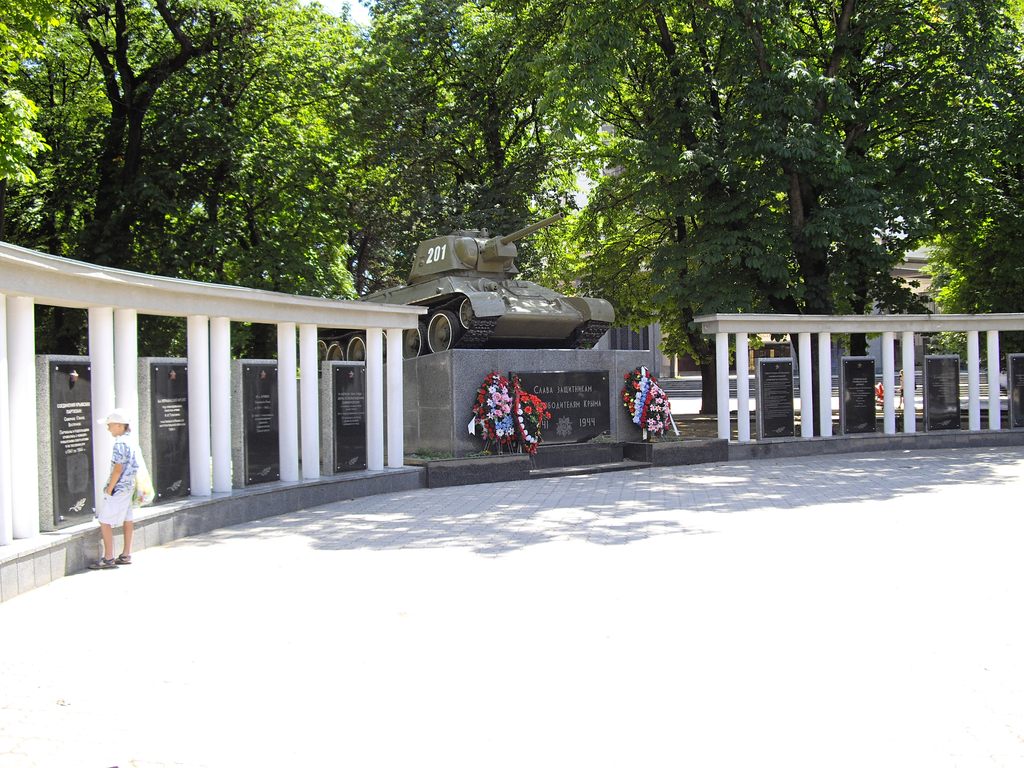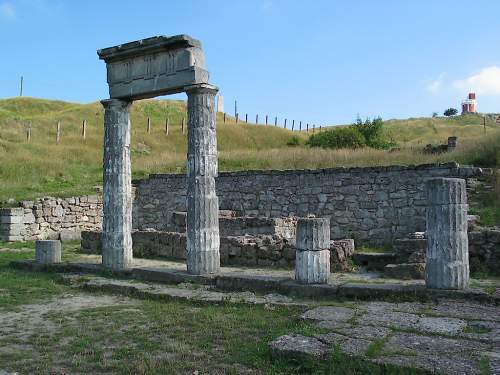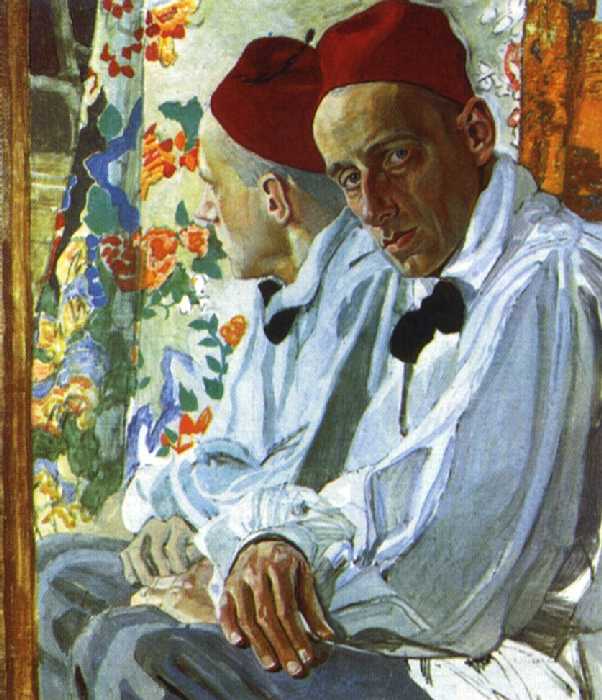|
Ilya Selvinsky
Ilya Lvovich Selvinsky (, 24 October 1899 – 22 March 1968) was a Soviet poet, dramatist, memoirist, and essayist born in Simferopol, Crimea. Biography Selvinsky grew up in Yevpatoria in a Jewish family. His father was a furrier merchant. In 1919, Selvinsky graduated from a gymnasium in Yevpatoria, spending his summers as a vagabond and trying his hands at different trades, including sailing, fishing, working as a longshoreman and circus wrestler, and acting in an itinerant theater. Selvinsky published his first poem in 1915 and in the 1920s experimented with the use of Yiddishisms and thieves' lingo in Russian verse. He is credited with innovations in Russian versification, including the proliferation of taktovik, a Russian nonclassical meter. Extensive travel and turbulent adventures fueled Selvinsky's longer narrative works and cycles, "loadified" (term used by the Russian constructivists) with local color. Selvinsky briefly joined the anarchist troops in the Russian Civil ... [...More Info...] [...Related Items...] OR: [Wikipedia] [Google] [Baidu] |
Simferopol
Simferopol ( ), also known as Aqmescit, is the second-largest city on the Crimea, Crimean Peninsula. The city, along with the rest of Crimea, is internationally recognised as part of Ukraine, but controlled by Russia. It is considered the capital of the Autonomous Republic of Crimea. Since 2014 it has been under the ''de facto'' control of Russia, which Annexation of Crimea by the Russian Federation, annexed Crimea that year and regards Simferopol as the capital of the Republic of Crimea (Russia), Republic of Crimea. Simferopol is an important political, economic and transport hub of the peninsula, and serves as the administrative centre of both Simferopol Municipality and the surrounding Simferopol District. Its population was After the 1784 Annexation of Crimea by the Russian Empire, annexation of the Crimean Khanate by the Russian Empire, the Russian empress decreed the foundation of a city named Simferopol on the location of the Crimean Tatars, Crimean Tatar town of Old ... [...More Info...] [...Related Items...] OR: [Wikipedia] [Google] [Baidu] |
Red Army
The Workers' and Peasants' Red Army, often shortened to the Red Army, was the army and air force of the Russian Soviet Republic and, from 1922, the Soviet Union. The army was established in January 1918 by a decree of the Council of People's Commissars to oppose the military forces of the new nation's adversaries during the Russian Civil War, especially the various groups collectively known as the White Army. In February 1946, the Red Army (which embodied the main component of the Soviet Armed Forces alongside the Soviet Navy) was renamed the "Soviet Army". Following the dissolution of the Soviet Union it was split between the post-Soviet states, with its bulk becoming the Russian Ground Forces, commonly considered to be the successor of the Soviet Army. The Red Army provided the largest land warfare, ground force in the Allies of World War II, Allied victory in the European theatre of World War II, and its Soviet invasion of Manchuria, invasion of Manchuria assisted the un ... [...More Info...] [...Related Items...] OR: [Wikipedia] [Google] [Baidu] |
Central Committee Of The Communist Party Of The Soviet Union
The Central Committee of the Communist Party of the Soviet Union was the Central committee, highest organ of the Communist Party of the Soviet Union (CPSU) between Congress of the Communist Party of the Soviet Union, Congresses. Elected by the Congress, the Central Committee emerged as the core nexus of executive and administrative authority in the party, with de facto supremacy over the government of Russian Soviet Federative Socialist Republic, Soviet Russia and the Soviet Union. It was composed of full members and candidate (non-voting) members. Real authority was often concentrated in smaller, more agile organs elected by the Committee, namely the Politburo of the Communist Party of the Soviet Union, Politburo, Secretariat of the Communist Party of the Soviet Union, Secretariat, and Orgburo (dissolved in 1952), as well as in the post of General Secretary of the Communist Party of the Soviet Union, General Secretary. Theoretically a Collective leadership in the Soviet Union, c ... [...More Info...] [...Related Items...] OR: [Wikipedia] [Google] [Baidu] |
Shoah
The Holocaust (), known in Hebrew language, Hebrew as the (), was the genocide of History of the Jews in Europe, European Jews during World War II. From 1941 to 1945, Nazi Germany and Collaboration with Nazi Germany and Fascist Italy, its collaborators systematically murdered some six million Jews across German-occupied Europe, around two-thirds of Europe's Jewish population. The murders were carried out primarily through mass shootings and poison gas in extermination camps, chiefly Auschwitz concentration camp#Auschwitz II-Birkenau, Auschwitz-Birkenau, Treblinka extermination camp, Treblinka, Belzec extermination camp, Belzec, Sobibor extermination camp, Sobibor, and Chełmno extermination camp, Chełmno in Occupation of Poland (1939–1945), occupied Poland. Separate Nazi persecutions killed a similar or larger number of non-Jewish civilians and prisoners of war (POWs); the term ''Holocaust'' is sometimes used to include the murder and persecution of Victims of Nazi ... [...More Info...] [...Related Items...] OR: [Wikipedia] [Google] [Baidu] |
Maxim D
Maxim or Maksim may refer to: Entertainment * ''Maxim'' (magazine), an international men's magazine ** ''Maxim'' (Australia), the Australian edition ** ''Maxim'' (India), the Indian edition * Maxim Radio, ''Maxim'' magazine's radio channel on Sirius Satellite Radio *''Maxim'', a fictional ship in the manga and anime series ''One Piece'' *Maxim, the hero of the video game '' Lufia II: Rise of the Sinistrals'' and its remake, '' Lufia: Curse of the Sinistrals'' Literature and language *A species of adage, aphorism, or saying that expresses a general moral rule, especially a philosophical maxim * ''Maxims'' (Old English poems), examples of gnomic poetry *'' Maximes'' (1665–78) of François de La Rochefoucauld (1613–80) Organizations * Mary Maxim, craft and needlework mail-order company in Canada *Maxim Brewery, brewing company in England *Maxim's Catering, chain of caterers, restaurants, and fast food shops in Hong Kong * Maxim Healthcare Services, medical staffing and home ... [...More Info...] [...Related Items...] OR: [Wikipedia] [Google] [Baidu] |
Kerch
Kerch, also known as Keriç or Kerich, is a city of regional significance on the Kerch Peninsula in the east of Crimea. It has a population of Founded 2,600 years ago as the Colonies in antiquity#Greek colonies, ancient Greek colony Pantikapaion, Kerch is one of the most ancient cities in Crimea. The city experienced rapid growth starting in the 1920s and was the site of Battle of the Kerch Peninsula, a major battle during World War II. Today, it is one of the largest cities in Crimea and is among the area's most important industrial, transport and tourist centres. As with the rest of Crimea, it has been occupied by Russian forces since the Annexation of Crimea by the Russian Federation, Russian annexation of Crimea in 2014. History Ancient times Archeological digs at Mayak village near the city ascertained that the area had already been inhabited in the 17th–15th centuries BC. While many finds from Kerch can be found in the Hermitage Museum in St Petersburg and the loc ... [...More Info...] [...Related Items...] OR: [Wikipedia] [Google] [Baidu] |
Communist Party Of The Soviet Union
The Communist Party of the Soviet Union (CPSU),. Abbreviated in Russian as КПСС, ''KPSS''. at some points known as the Russian Communist Party (RCP), All-Union Communist Party and Bolshevik Party, and sometimes referred to as the Soviet Communist Party (SCP), was the founding and ruling political party of the Soviet Union. The CPSU was the One-party state, sole governing party of the Soviet Union until 1990 when the Congress of People's Deputies of the Soviet Union, Congress of People's Deputies modified Article 6 of the Soviet Constitution, Article 6 of the 1977 Soviet Constitution, which had previously granted the CPSU a monopoly over the political system. The party's main ideology was Marxism–Leninism. The party was outlawed under Russian President Boris Yeltsin's decree on 6 November 1991, citing the 1991 Soviet coup attempt as a reason. The party started in 1898 as part of the Russian Social Democratic Labour Party. In 1903, that party split into a Menshevik ("mino ... [...More Info...] [...Related Items...] OR: [Wikipedia] [Google] [Baidu] |
Kuban
Kuban ( Russian and Ukrainian: Кубань; ) is a historical and geographical region in the North Caucasus region of southern Russia surrounding the Kuban River, on the Black Sea between the Don Steppe, the Volga Delta and separated from the Crimean Peninsula to the west by the Kerch Strait. Krasnodar Krai is often referred to as ''Kuban'', both officially and unofficially, although the term is not exclusive to the krai and also accommodates the republics of Adygea, Karachay-Cherkessia, and parts of Stavropol Krai. Cossack settlement The Cossack settlement of Kuban and of the adjacent Black Sea region occurred gradually for over a century, and was heavily influenced by the outcomes of the conflicts between Russia and Ottoman Empire.Azarenkova et al., pp. 8ff. In the mid-18th century, the area was predominantly inhabited by the Adyghe tribes. After the Russo-Turkish War of 1768–1774, the population of the area started to show more pro-Russian tendencies. ... [...More Info...] [...Related Items...] OR: [Wikipedia] [Google] [Baidu] |
North Caucasus
The North Caucasus, or Ciscaucasia, is a subregion in Eastern Europe governed by Russia. It constitutes the northern part of the wider Caucasus region, which separates Europe and Asia. The North Caucasus is bordered by the Sea of Azov and the Black Sea to the west, the Caspian Sea to the east, and the Caucasus Mountains to the south. The region shares land borders with the countries of Georgia (country), Georgia and Azerbaijan in the South Caucasus. Located in the southern part of the region, Mount Elbrus is the List of European ultra-prominent peaks, tallest peak in Europe. Krasnodar is the List of cities and towns in Russia by population, most populous among the urban area, urban centres in the region. The North Caucasus came under Russian control in the 19th century, following the Caucasian War between the Russian Empire and the various regional powers. The territory is the Southern Russia, southernmost portion of Russia and is divided between a number of Republics of Russia, ... [...More Info...] [...Related Items...] OR: [Wikipedia] [Google] [Baidu] |
Vsevolod Meyerhold
Vsevolod Emilyevich Meyerhold (; born ; 2 February 1940) was a Russian and Soviet theatre director, actor and theatrical producer. His provocative experiments dealing with physical being and symbolism in an unconventional theatre setting made him one of the seminal forces in modern international theatre. During the Great Purge, Meyerhold was arrested in June 1939. He was tortured, his wife was murdered, and he was executed on 2 February 1940. Life and work Early life Vsevolod Meyerhold was born Karl Kasimir Theodor Meyerhold in Penza on to Russian-German wine manufacturer Friedrich Emil Meyerhold and his Baltic German wife, Alvina Danilovna (). He was the youngest of eight children.Pitches (2003, pg. 4) His father came from an old noble family Meyerhold von Ritterholm. The elder Meyerhold emigrated to Russia in the 1850s. After completing school in 1895, Meyerhold studied law at Moscow University but never completed his degree. He was torn between studying theatr ... [...More Info...] [...Related Items...] OR: [Wikipedia] [Google] [Baidu] |
Yevgeny Gabrilovich
Yevgeny Iosifovich Gabrilovich (; 29 September 1899 – 5 December 1993) was a Soviet and Russian writer, playwright and screenwriter. He wrote for 29 films between 1936 and 1988. // КиноПоиск Filmography * '' The Last Night'' (1936), together with * '' Mashenka'' ( ...[...More Info...] [...Related Items...] OR: [Wikipedia] [Google] [Baidu] |
Vladimir Lugovskoy
Vladimir Alexandrovich Lugovskoy (; July 1, 1901 Moscow - June 5, 1957 Yalta) was a constructivist poet known for writing the choir of " Arise, Russian People!" for the film Alexander Nevsky. In later years, his poetry became filled with imagery and emotion. Born in to the family of a teacher of the and a mother who was a professional singer. He graduated from the gymnasium and entered the Moscow State University but his studies were cut short after he was enrolled in the Red Army's Western Front and served in a field hospital. After returning from the front he started study at the general school of Vsevobuch. He served in the department of internal affairs of the Kremlin and in the military school of the All-Russian Central Executive Committee. The Russian Revolution, the subsequent Civil War, Russian history and the nature of the North, where the poet's father came from, formed the initial circle of impressions and poetic images of V.A Lugovsky. Lugovskoy began writing poe ... [...More Info...] [...Related Items...] OR: [Wikipedia] [Google] [Baidu] |








